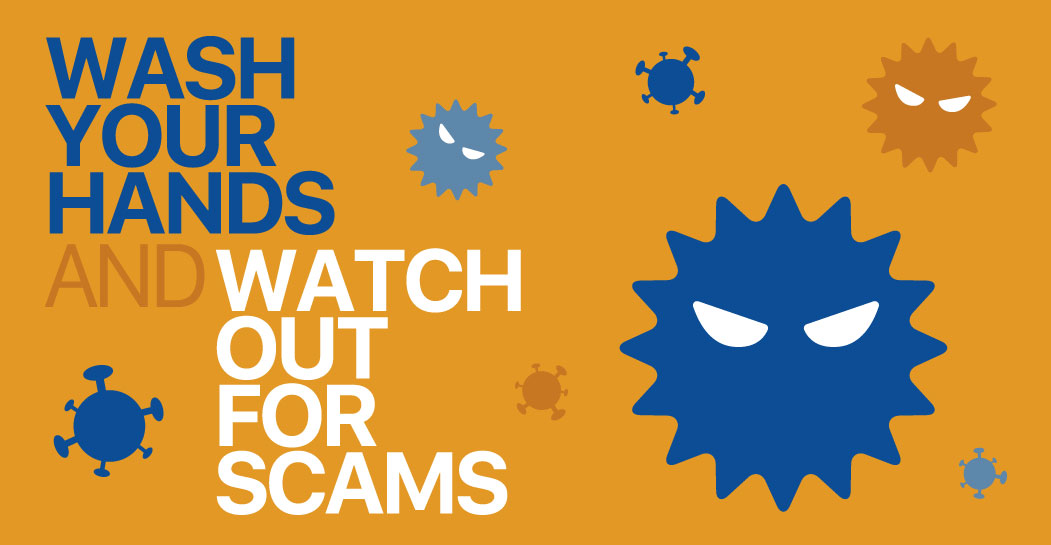Wash Your Hands, and Watch Out for Scams
September 17, 2020

From checking your Facebook and Twitter accounts to watching the TV news (yes, some people still do that), everywhere you turn right now you’re likely to hear or see something about COVID-19 and the best ways to stay healthy. The key is to determine who and what to listen to.
The same is true when it comes to protecting your finances. While there is a lot of good, credible advice out there, on the flip side, you may find several not-so-trustworthy sources, including scammers trying to take advantage of the current environment of fear and uncertainty in order to con you.
According to the Better Business Bureau (BBB), fraudsters are hard at work to gain your trust, deploying a variety of scams to get you to share sensitive information about accounts and bilk you out of our hard-earned money. In fact, the Federal Trade Commission (FTC) reported that since the beginning of the year, they have received “more than 7,800 coronavirus-related reports about cancellations and refunds, reports about problems with online shipping, mobile texting scams and government and business imposter scams,” with consumers losing a total of $4.77 million.
Facebook and Phone Scams
One scam targets seniors via Facebook with a post that features a special grant to help pay medical bills. The post includes a link directing you to a fake government website for a phony agency called the “U.S. Emergency Grants Federation.” Visitors to the site are asked to divulge their Social Security Number to verify their identity. Similar scams claim individuals can get additional funds, (sometimes up to $150,000) by paying a grant “processing fee.”
Likewise, a current phone scam in North Carolina tricks victims by telling them they qualify for a special coronavirus stimulus payment but are first asked to pay an upfront “processing fee.”
FACTS & SCAM ALERT:
- A news release posted on the IRS website and dated March 30, 2020, outlines the coronavirus economic impact check amounts and requirements, and clearly states that “no action is required from most people at this time.” While there are income-based eligibility requirements, there is NO PROCESSING FEE in order to be eligible for an economic impact (stimulus) check.
- Never pay a fee for a government grant. The only official list of all U.S. Federal Grant-Making agencies can be found at grants.gov.
- Use extreme caution before giving out your Social Security Number, birthdate and other sensitive information, especially to places that should already have that info. Always question why it is needed.
U.S. Treasury Check & Direct Deposit Scams
Depending how you filed your taxes in 2018 or 2019, if you are eligible for an economic impact check, your payment will either be directly deposited into your credit union or bank account, or you will be issued a check. For more details and updates on the distribution of coronavirus economic impact payments, visit the IRS website at https://www.irs.gov/coronavirus.
FACTS & SCAM ALERT:
- Direct Deposit – If you are eligible for a direct deposit payment, funds will be deposited in the credit union or bank account listed when you filed your 2018 or 2019 taxes. The government will NOT contact you to ask for your account number—they already have it.
- U.S. Treasury Checks – If you mailed a paper copy of your tax returns the past couple of years, you may receive a paper check instead of direct deposit, so watch your mailbox to avoid theft. According to the IRS, you may need to submit a simple tax return in order to receive the stimulus payment, but they ask that you check their website for updates at https://www.irs.gov/coronavirus instead of trying to call them.
Here are a few more tips from the Federal Trade Commission to help you avoid coronavirus scams:
- Hang up on robocalls
- Ignore online offers for vaccinations and home test kits
- Fact-check information & verify your sources
- Know who you’re buying from
- Don’t respond to unsolicited texts or emails about checks from the government
- Don’t click on links from sources you don’t know (always good advice!)
- Know who you’re donating too, and don’t let any one rush you into decisions to give
- Be suspicious of emails supposedly from the Centers for Disease Control, and don’t click on links
The FTC website at https://www.consumer.ftc.gov/features/coronavirus-scams-what-ftc-doing is a wealth of information about coronavirus-related and other scams, and you can also opt to sign up for alerts about personal and business scams.
These are uncertain times to be sure, so be careful where you get your answers, especially when it comes to your finances. We are always here for our Unison members, so feel free to contact us by email or call one of our member advisors at (920) 766-6000 with any questions you may have.
In the meantime, wash your hands and watch out for scams. And keep in mind the old saying, “If it sounds too good to be true, it probably is.”

